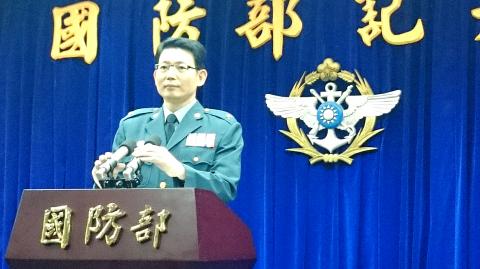The National Security Bureau (NSB) yesterday rejected a report that National Security Council Secretary-General King Pu-tsung (金溥聰) suggested that the military should intervene in and handle major demonstrations.
King was accused of overreaching his authority earlier this month when he visited the National Police Agency and the Ministry of Justice’s Investigation Bureau.
King, in a meeting with unnamed officials, was reported by the officials as asking police to toughen up in dealing with mass demonstrations, Democratic Progressive Party (DPP) Legislator Chiu Yi-ying (邱議瑩) said yesterday.

Photo: Taipei Times
In the face of large protests, the Ministry of National Defense should set up a command center to coordinate security missions, Chiu reported his sources as saying.
King allegedly added that military officials should be able to enter the police agency to direct security tasks.
Agency officials said that the officials at the meeting were surprised at King’s remarks, Chiu said.
“King infringed on the Constitution and now he is turning Taiwan into a military state,” Chiu said, accusing the Chinese Nationalist Party (KMT) government of regarding the public as enemies.
The bureau rebutted the report in a press statement later yesterday.
It said that suggestions were made by NSB Director-General Lee Hsiang-chou (李翔宙) who accompanied King to the meeting, in light of the incident on Jan. 25 in which truck driver Chang Te-cheng (張德正) allegedly drove his vehicle past barriers and up the front steps of the Presidential Office Building.
The statement said that Lee had suggested police should establish advanced warning, intelligence-gathering, and reporting and communications systems, as well as an inter-departmental coordination system to prevent similar incidents.
King did not say that the military should handle security issues during demonstrations, it said.
The statement reiterated that King’s visits were in accordance with the bureau’s Organic Act (國家安全局組織法) and the National Intelligence Services Act (國家情報工作法), which say that the bureau is responsible for directing and supporting intelligence and security agencies.
The police said in a statement that public demonstrations are handled by police in accordance with the Assembly and Parade Act (集會遊行法), and that King did not say that the military should take part in handling rallies.
Military spokesman David Lo (羅紹和) said yesterday that the military did not receive such orders as Chiu had reported.

ACTION PLAN: Taiwan would expand procurement from the US and encourage more companies to invest in the US to deepen bilateral cooperation, Lai said The government would not impose reciprocal tariffs in retaliation against US levies, President William Lai (賴清德) said yesterday, as he announced five strategies to address the issue, including pledging to increase Taiwanese companies’ investments in the US. Lai has in the past few days met with administrative and national security officials, as well as representatives from various industries, to explore countermeasures after US President Donald Trump on Wednesday last week announced a 32 percent duty on Taiwanese imports. In a video released yesterday evening, Lai said that Taiwan would not retaliate against the US with higher tariffs and Taiwanese companies’ commitments to

Intelligence agents have recorded 510,000 instances of “controversial information” being spread online by the Chinese Communist Party (CCP) so far this year, the National Security Bureau (NSB) said in a report yesterday, as it warned of artificial intelligence (AI) being employed to generate destabilizing misinformation. The bureau submitted a written report to the Legislative Yuan in preparation for National Security Bureau Director-General Tsai Ming-yen’s (蔡明彥) appearance before the Foreign Affairs and National Defense Committee today. The CCP has been using cognitive warfare to divide Taiwanese society by commenting on controversial issues such as Taiwan Semiconductor Manufacturing Co’s (TSMC, 台積電) investments in the

‘SPECIAL CHANNEL’: Taipei’s most important tasks are to stabilize industries affected by Trump’s trade tariffs and keep negotiations with Washington open, a source said National Security Council Secretary-General Joseph Wu (吳釗燮) arrived in the US for talks with US President Donald Trump’s administration, a source familiar with the matter said on Friday. Wu was leading a delegation for a meeting known as the “special channel,” the Financial Times reported earlier. It marked Trump’s first use of the channel since returning to the White House on Jan. 20. Citing a source familiar with the matter, the Financial Times reported that Minister of Foreign Affairs Lin Chia-lung (林佳龍) was also a part of the delegation. The visit came days after China concluded war games around Taiwan and amid Trump’s

HELPING HAND: The steering committee of the National Stabilization Fund is expected to hold a meeting to discuss how and when to utilize the fund to help buffer the sell-off The TAIEX plunged 2,065.87 points, or 9.7 percent, to close at 19,232.35 yesterday, the highest single-day percentage loss on record, as investors braced for US President Donald Trump’s tariffs after an extended holiday weekend. Amid the pessimistic atmosphere, 945 listed companies led by large-cap stocks — including Taiwan Semiconductor Manufacturing Co (TSMC, 台積電), Hon Hai Precision Industry Co (鴻海精密) and Largan Precision Co (大立光) — fell by the daily maximum of 10 percent at the close, Taiwan Stock Exchange data showed. The number of listed companies ending limit-down set a new record, the exchange said. The TAIEX plunged by daily maxiumu in just